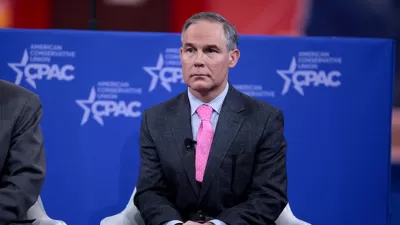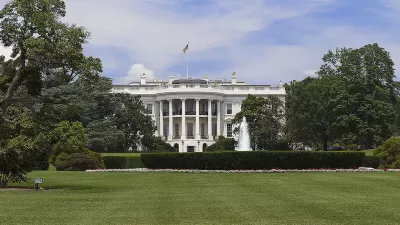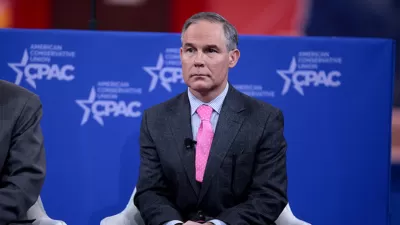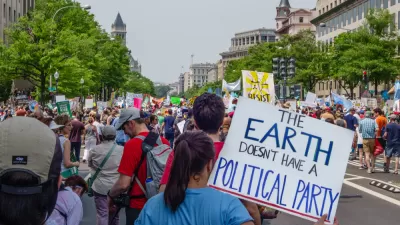Scientist are concerned that a congressionally mandated climate assessment, originally authorized under President George H.W. Bush, may not be released by the Trump Administration because it contradicts their rejection of climate science.

The New York Times has obtained a draft of the climate science section of the Fourth National Climate Assessment Update written by "scientists from 13 federal agencies," writes Lisa Friedman, a reporter on The New York Times' climate desk. The big question is whether they will authorize its release because of its findings.
It concludes that Americans are feeling the effects of climate change right now, directly contradicting claims by President Trump and members of his cabinet who say that the human contribution to climate change is uncertain, and that the ability to predict the effects is limited.
Urban planning community needs this information
Friedman was interviewed Tuesday evening by PBS NewsHour anchor Judy Woodruff, who asks, "What is the main concern if it’s not made public?"
"What I have heard from the scientists is that the real worry, if it’s not made public, is that it won’t be useful to people on the ground," answered Friedman.
"They tell me that the people who really use this report are city planners, are people in places like Florida who are trying to figure out how to best assess sea level rise around Miami Beach, people who design building codes to make them more resilient to the impacts of extreme weather."
Confronting EPA Administrator Pruitt
In The New York Times video narrated by Friedman, she directly responds to climate denial claims made by U.S. Environmental Protection Agency Administrator Scott Pruitt. The EPA is one of the 13 agencies whose scientists contributed to the report and who have until August 18 to determine whether to approve it. Pruitt may initially have been viewed as a climate skeptic, but he transitioned to denial.
The assessment is mandated by Congress to be released every four years. "The National Academy of Sciences has signed off on the draft report, and the authors are awaiting permission from the Trump administration to release it," adds Friedman. The 2014 report issued under President Obama is posted here.
Friedman adds that how the administration handles the report is being viewed as a test case by the scientific community. They need to make their decision by August 18.
Climate change censored
In related news, Oliver Milman, environment reporter for the Guardian, reports on August 7 that the "US Department of Agriculture (USDA) have been told to avoid using the term climate change in their work, with the officials instructed to reference 'weather extremes' instead." That move was predated by the White House webmasters who began removing references to the term after the inauguration. The Hill confirmed the controversial web changes in April.
Withdrawal from Paris climate accord
"The Trump administration began the formal process to withdraw from the Paris climate accord, but says it’s willing to 're-engage' if terms more favorable to the U.S. are met," reports Bloomberg's Ari Natter on August 4.
FULL STORY: Scientists Fear Trump Will Dismiss Blunt Climate Report

Maui's Vacation Rental Debate Turns Ugly
Verbal attacks, misinformation campaigns and fistfights plague a high-stakes debate to convert thousands of vacation rentals into long-term housing.

Planetizen Federal Action Tracker
A weekly monitor of how Trump’s orders and actions are impacting planners and planning in America.

San Francisco Suspends Traffic Calming Amidst Record Deaths
Citing “a challenging fiscal landscape,” the city will cease the program on the heels of 42 traffic deaths, including 24 pedestrians.

Defunct Pittsburgh Power Plant to Become Residential Tower
A decommissioned steam heat plant will be redeveloped into almost 100 affordable housing units.

Trump Prompts Restructuring of Transportation Research Board in “Unprecedented Overreach”
The TRB has eliminated more than half of its committees including those focused on climate, equity, and cities.

Amtrak Rolls Out New Orleans to Alabama “Mardi Gras” Train
The new service will operate morning and evening departures between Mobile and New Orleans.
Urban Design for Planners 1: Software Tools
This six-course series explores essential urban design concepts using open source software and equips planners with the tools they need to participate fully in the urban design process.
Planning for Universal Design
Learn the tools for implementing Universal Design in planning regulations.
Heyer Gruel & Associates PA
JM Goldson LLC
Custer County Colorado
City of Camden Redevelopment Agency
City of Astoria
Transportation Research & Education Center (TREC) at Portland State University
Jefferson Parish Government
Camden Redevelopment Agency
City of Claremont





























